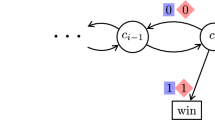Abstract
We study infinite stochastic games played by n-players on a finite graph with goals specified by sets of infinite traces. The games are concurrent (each player simultaneously and independently chooses an action at each round), stochastic (the next state is determined by a probability distribution depending on the current state and the chosen actions), infinite (the game continues for an infinite number of rounds), nonzero-sum (the players’ goals are not necessarily conflicting), and undiscounted. We show that if each player has an upward-closed objective, then there exists an ε-Nash equilibrium in memoryless strategies, for every ε>0; and exact Nash equilibria need not exist. Upward-closure of an objective means that if a set Z of infinitely repeating states is winning, then all supersets of Z of infinitely repeating states are also winning. Memoryless strategies are strategies that are independent of history of plays and depend only on the current state. We also study the complexity of finding values (payoff profile) of an ε-Nash equilibrium. We show that the values of an ε-Nash equilibrium in nonzero-sum concurrent games with upward-closed objectives for all players can be computed by computing ε-Nash equilibrium values of nonzero-sum concurrent games with reachability objectives for all players and a polynomial procedure. As a consequence we establish that values of an ε-Nash equilibrium can be computed in TFNP (total functional NP), and hence in EXPTIME.
This research was supported in part by the NSF grants CCR-0225610 and CCR-0234690, and by the SNSF under the Indo-Swiss Joint Research Programme.
Preview
Unable to display preview. Download preview PDF.
Similar content being viewed by others
References
Chatterjee, K.: Two-player nonzero-sum ω-regular games. In: Abadi, M., de Alfaro, L. (eds.) CONCUR 2005. LNCS, vol. 3653, pp. 413–427. Springer, Heidelberg (2005)
Chatterjee, K., Majumdar, R., Jurdziński, M.: On Nash equilibria in stochastic games. In: Marcinkowski, J., Tarlecki, A. (eds.) CSL 2004. LNCS, vol. 3210, pp. 26–40. Springer, Heidelberg (2004)
Courcoubetis, C., Yannakakis, M.: The complexity of probabilistic verification. JACM 42(4), 857–907 (1995)
de Alfaro, L.: Formal Verification of Probabilistic Systems. PhD thesis, Stanford University (1997)
de Alfaro, L.: Computing minimum and maximum reachability times in probabilistic systems. In: Baeten, J.C.M., Mauw, S. (eds.) CONCUR 1999. LNCS, vol. 1664, pp. 66–81. Springer, Heidelberg (1999)
Filar, J., Vrieze, K.: Competitive Markov Decision Processes. Springer, Heidelberg (1997)
Fink, A.M.: Equilibrium in a stochastic n-person game. Journal of Science of Hiroshima University 28, 89–93 (1964)
Nash Jr., J.F.: Equilibrium points in n-person games. Proceedings of the National Academny of Sciences USA 36, 48–49 (1950)
Martin, D.A.: The determinacy of Blackwell games. Journal of Symbolic Logic 63(4), 1565–1581 (1998)
Owen, G.: Game Theory. Academic Press, London (1995)
Papadimitriou, C.H.: On the complexity of the parity argument and other inefficient proofs of existence. JCSS 48(3), 498–532 (1994)
Secchi, P., Sudderth, W.D.: Stay-in-a-set games. International Journal of Game Theory 30, 479–490 (2001)
Shapley, L.S.: Stochastic games. Proc. Nat. Acad. Sci. USA 39, 1095–1100 (1953)
Thomas, W.: Languages, automata, and logic. In: Handbook of Formal Languages, vol. 3, ch. 7, pp. 389–455. Springer, Heidelberg (1997)
Vieille, N.: Two player stochastic games I: a reduction. Israel Journal of Mathematics 119, 55–91 (2000)
Vieille, N.: Two player stochastic games II: the case of recursive games. Israel Journal of Mathematics 119, 93–126 (2000)
von Neumann, J., Morgenstern, O.: Theory of games and economic behavior. Princeton University Press, Princeton (1947)
Author information
Authors and Affiliations
Editor information
Editors and Affiliations
Rights and permissions
Copyright information
© 2006 Springer-Verlag Berlin Heidelberg
About this paper
Cite this paper
Chatterjee, K. (2006). Nash Equilibrium for Upward-Closed Objectives. In: Ésik, Z. (eds) Computer Science Logic. CSL 2006. Lecture Notes in Computer Science, vol 4207. Springer, Berlin, Heidelberg. https://doi.org/10.1007/11874683_18
Download citation
DOI: https://doi.org/10.1007/11874683_18
Publisher Name: Springer, Berlin, Heidelberg
Print ISBN: 978-3-540-45458-8
Online ISBN: 978-3-540-45459-5
eBook Packages: Computer ScienceComputer Science (R0)




